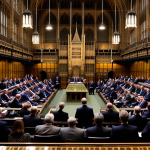Editorial Standards and Journalistic Principles in the UK
Editorial standards form the backbone of journalistic integrity within UK news organizations. These principles ensure that reporting remains fair, impartial, and accurate, fostering public trust. Most UK newsrooms adopt comprehensive editorial codes that guide their content creation, emphasizing balanced viewpoints and factual correctness.
At the heart of these editorial standards lies an insistence on impartiality. Journalists must present information without bias, allowing audiences to form their own opinions. Fairness is upheld by giving all relevant perspectives adequate coverage, while accuracy requires rigorous verification of facts before publication.
This might interest you : Enhance your living space using skylights for pitched roofs
Beyond general principles, UK news organizations enforce detailed in-house editorial guidelines that reflect their commitment to ethical journalism. These internal policies often include checks against sensationalism and the avoidance of conflicts of interest, reinforcing the newsroom’s responsibility to deliver truthful, trustworthy content. Adhering to these standards is crucial not only for maintaining credibility but also for meeting legal and regulatory obligations within the UK’s media landscape.
Fact-Checking Practices and Source Verification
Fact-checking procedures are fundamental to maintaining news accuracy in UK news organizations. Before publication, journalists undergo a rigorous process to verify information through multiple steps, ensuring facts are confirmed beyond doubt. This procedure typically involves cross-checking statements with at least two independent sources, prioritizing those regarded as reputable and authoritative in their fields.
Additional reading : How Will Recent Changes in UK Parliament Affect Future Policies?
Source verification plays a vital role in this process. UK newsrooms emphasize the importance of identifying original, firsthand sources whenever possible to reduce the risk of misinformation. Reporters actively avoid relying on hearsay or unverified social media content unless independently corroborated. Verification includes checking the credentials of sources and assessing any potential conflicts of interest that might influence reliability.
Leading UK news organizations implement structured fact-checking protocols. For example, many employ dedicated fact-checking teams that review complex or controversial stories, working alongside reporters to ensure accuracy. This collaboration helps catch errors early and upholds editorial standards. These practices not only protect journalistic integrity but also meet stringent regulatory requirements, reinforcing public trust in media content.
In summary, fact-checking procedures and stringent source verification are inseparable pillars of truthful reporting in UK newsrooms. They enable journalists to present verified information confidently, supporting the broader goals of editorial standards.
Corrections, Retractions, and Transparency Policies
A corrections policy is essential for UK news organizations to maintain credibility and uphold transparency with their audience. Typically, media outlets publish clear guidelines explaining how errors are identified, addressed, and communicated publicly. This openness reinforces trust by demonstrating accountability when mistakes occur.
When a factual error is discovered, newsrooms follow structured procedures for issuing corrections or full retractions in media if necessary. Corrections often appear in a designated section of the publication, clarifying the original mistake and providing the accurate information. Retractions are more comprehensive actions taken when content is significantly flawed or misleading, ensuring that misleading narratives are not perpetuated.
Handling reader complaints forms a key part of this process. Reputable UK news organizations provide accessible channels for audiences to report inaccuracies. Journalists and editorial staff investigate these claims promptly, and if valid, initiate corrections following their established policies. Such responsiveness highlights a commitment to journalistic integrity by respecting the audience’s role in fact-checking and accountability.
Ultimately, robust corrections and transparency policies are vital. They enable continuous improvement in reporting standards while strengthening the relationship between the media and the public by fostering openness and reliability.
Codes of Ethics and Professional Conduct
In the UK, a code of ethics serves as the foundational framework that governs journalistic behaviour, underpinning journalistic ethics UK with clear expectations for fairness, accuracy, and accountability. UK news organizations commonly adopt both national and internal codes to ensure that reporters maintain the highest standards of professional conduct.
One significant reference point is the National Union of Journalists (NUJ) Code of Conduct, which emphasizes the duty to report truthfully, avoid misleading information, and respect confidentiality where necessary. This code mandates impartiality and fairness in coverage, prohibiting discrimination or exploitation of vulnerable subjects.
Beyond the NUJ, many UK newsrooms enforce additional organizational codes that address conflicts of interest, safeguarding against undue influence over news content. These ethical guidelines require journalists to disclose any personal or financial considerations that could compromise their objectivity.
Adherence to these codes is critical for preserving journalistic integrity. It reinforces public confidence by ensuring that news reporting is not only accurate but also conducted with respect for the ethical responsibilities owed to the audience and society. In practice, these standards guide daily editorial decisions and shape the professional behaviour expected within UK media.
Journalist Training and Continuous Professional Development
Continuous journalist training UK is integral to maintaining high newsroom standards and safeguarding news accuracy in UK media. Entry-level journalists undergo structured programs to instill core competencies, including fact-checking techniques, ethical reporting, and source verification. These foundational skills ensure they align with the editorial standards upheld across UK news organizations.
Beyond initial training, ongoing professional development is mandatory. Newsrooms frequently hold workshops and seminars that update reporters on evolving ethical considerations, digital verification tools, and regulatory compliance. This approach ensures journalists are equipped to handle emerging challenges in a rapidly changing media landscape, reinforcing journalistic integrity at every stage.
Internal mentorship also plays a crucial role. Experienced reporters guide newer colleagues through real-world applications of editorial policies and fact-checking procedures, fostering a culture of accuracy and accountability. Cross-checking partnerships among journalists further enhance content reliability, helping to preempt errors before publication.
Together, these training and development initiatives sustain the overall quality and trustworthiness of UK news organizations, directly contributing to public confidence in their reporting.
Editorial Standards and Journalistic Principles in the UK
Editorial standards in UK news organizations serve as the foundation for ensuring journalistic integrity and trustworthy reporting. Commonly, these standards are encapsulated in editorial codes that define the expectations for accuracy, impartiality, and fairness in all news coverage. These codes act as guiding principles for journalists to navigate ethical challenges, emphasizing the responsibility to present facts without bias and to offer balanced perspectives.
Impartiality remains a cornerstone of editorial standards. Journalists must consistently avoid any partiality that could influence the framing or tone of a story. Fairness complements this by ensuring all relevant viewpoints receive equitable attention, which not only enriches the narrative but protects against skewed reporting. Accuracy demands rigorous verification of information, mandating that UK news organizations confirm details thoroughly before publication to prevent the spread of misinformation.
In addition to nationally recognized codes, many UK newsrooms maintain detailed in-house editorial guidelines. These internal policies reinforce the broader principles by addressing specific issues such as avoiding sensationalism, managing conflicts of interest, and maintaining appropriate separation between editorial content and advertising. Enforcement of these guidelines involves editorial oversight and fact-checking processes that hold journalists accountable and sustain consistent quality.
By upholding editorial standards rigorously, UK news organizations preserve public trust and uphold the ethical tenets essential to democratic discourse. This commitment to journalistic integrity differentiates reputable media from less reliable sources, fostering an informed and engaged audience.
Editorial Standards and Journalistic Principles in the UK
Editorial standards form the cornerstone of journalistic integrity within UK news organizations, setting clear expectations for content quality and ethical reporting. Most UK newsrooms adopt comprehensive editorial codes that emphasize three critical pillars: impartiality, fairness, and accuracy. These principles are not merely theoretical; they guide every stage of news production to ensure information is presented responsibly and reliably.
Impartiality requires journalists to avoid bias, enabling audiences to interpret events based on a balanced presentation. Fairness involves covering all relevant perspectives equitably, ensuring no viewpoint is marginalized or unduly emphasized. Accuracy mandates diligent fact verification to avoid errors or misleading information, which underpins audience trust and preserves the credibility of the news organization.
Beyond widely accepted national editorial codes, many UK news organizations implement specific in-house editorial guidelines that provide detailed instructions tailored to their editorial environment. These internal rules often include policies against sensationalism, strict management of conflicts of interest, and clear differentiation between editorial content and advertising to protect transparency. Enforcement typically involves editorial oversight mechanisms and fact-checking protocols, holding journalists accountable and maintaining the integrity of published content.
By adhering to these robust editorial standards, UK news organizations uphold the values essential for trustworthy reporting, reinforcing their role as reliable sources of information in a democratic society.






